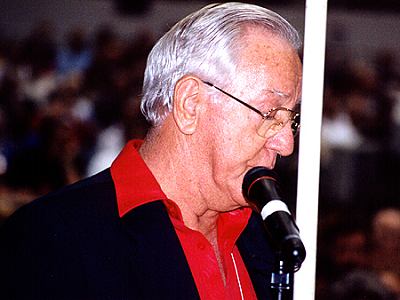General Board of Global Ministries
![]()
UM Information
UM
Reporter
![]()
Florida Southern College
![]()
Bethune
Cookman College
![]()
FL UM Children's Home
![]()
|
|
Conference votes to close print shop |
|
Photo by the Rev. David L. Adams |
| Discussion over the future of the Florida Conference Print Shop the last day of the conference session included a motion by Don Heishman, a former manager of the print shop, to make it a separate agency of the conference. That motion and an amendment to the task force's recommendation to close the print shop did not pass. |
By Michael Wacht LAKELAND — Delegates to the Dare to Share Jesus 2001 Florida Conference Event voted June 1 to close the Florida Conference Print Shop. The exact date of closing will be decided by the executive committee of the Conference Council on Finance and Administration (CF&A), which serves as the conference’s personnel committee, and a committee to be appointed by Bishop Timothy Whitaker, CF&A and the conference trustees, which will dispose of the equipment and inventory, according to the Rev. Keith Ewing, the bishop’s administrative assistant. The print shop study task force appointed by the late Bishop Cornelius L. Henderson and confirmed by Bishop J. Lloyd Knox recommended to the conference that the print shop be closed. The recommendation was based on the task force’s study of the finances, history and service record of the print shop and current technology and printing industry dynamics. The task force included Florida Conference clergy, one district superintendent, conference staff and laity. Several members have current or past experience in the printing industry. The Rev. Ed Dinkins, a retired elder, served as chairman. Dinkins told delegates the task force had talked with former print shop management. Dinkins said he also regularly visited the print shop during the course of its study. The print shop’s financial statements were audited by Baylis & Company PA, the conference’s auditors. One of the main problems with the print shop is the management, according to Dinkins. “Many of the comments we received were concerning management: the response of management, the ability to approach management,” he said. “We don’t see solving that problem without significant cost to the annual conference.” Dinkins also told delegates the print shop did not offer savings on printed material. He said the print shop’s bid to print the 2001 Florida Annual Conference Event Journal was more than 116 percent higher than the bid from M.A. Publishing, which printed the 2000 Journal. The Rev. Margaret Johnson, pastor of Trinity United Methodist Church in Charlotte Harbor, proposed an amendment to the task force’s recommendation calling for the conference to give print shop employees the equipment and inventory at no charge “if those working at the print shop wish to continue there as their own business.” B. A. Grubbs, a lay delegate from Jacksonville and a human resources consultant, said he has worked with many individuals in layoff and closedown situations. He told the conference to make every effort to assist the employees, especially with outplacement services, but Johnson’s proposal “is not reasonable, appropriate or necessary.” The amendment failed. Don Heishman, former manager of the print shop, offered a substitute motion to the task force’s recommendation. Heishman asked that the print shop be set up as an independent agency of the annual conference, accountable to audits by CF&A. His motion called for the creation of an advisory committee to help develop marketing strategies and ensure sound business practices. The motion also asked the conference to designate the print shop as the “primary print supplier” for all conference and district agencies. Heishman said the print shop had loyally served and supported local churches through its ministry since it opened in 1970. He said its financial losses were due in part to offering a discount on the cost of printing the Journal for the conference, statements by conference leaders encouraging churches to get their printing done locally, and conference agencies and committees using other printers. Supporters of the print shop spoke of its history of service and examples of pieces printed there, while those supporting the task force’s recommendation said their churches did not use the print shop because of slow turnaround time and the convenience of desktop publishing. Heishman’s substitute motion was defeated and delegates subsequently voted to support the task force’s recommendation. Top
of this page |

